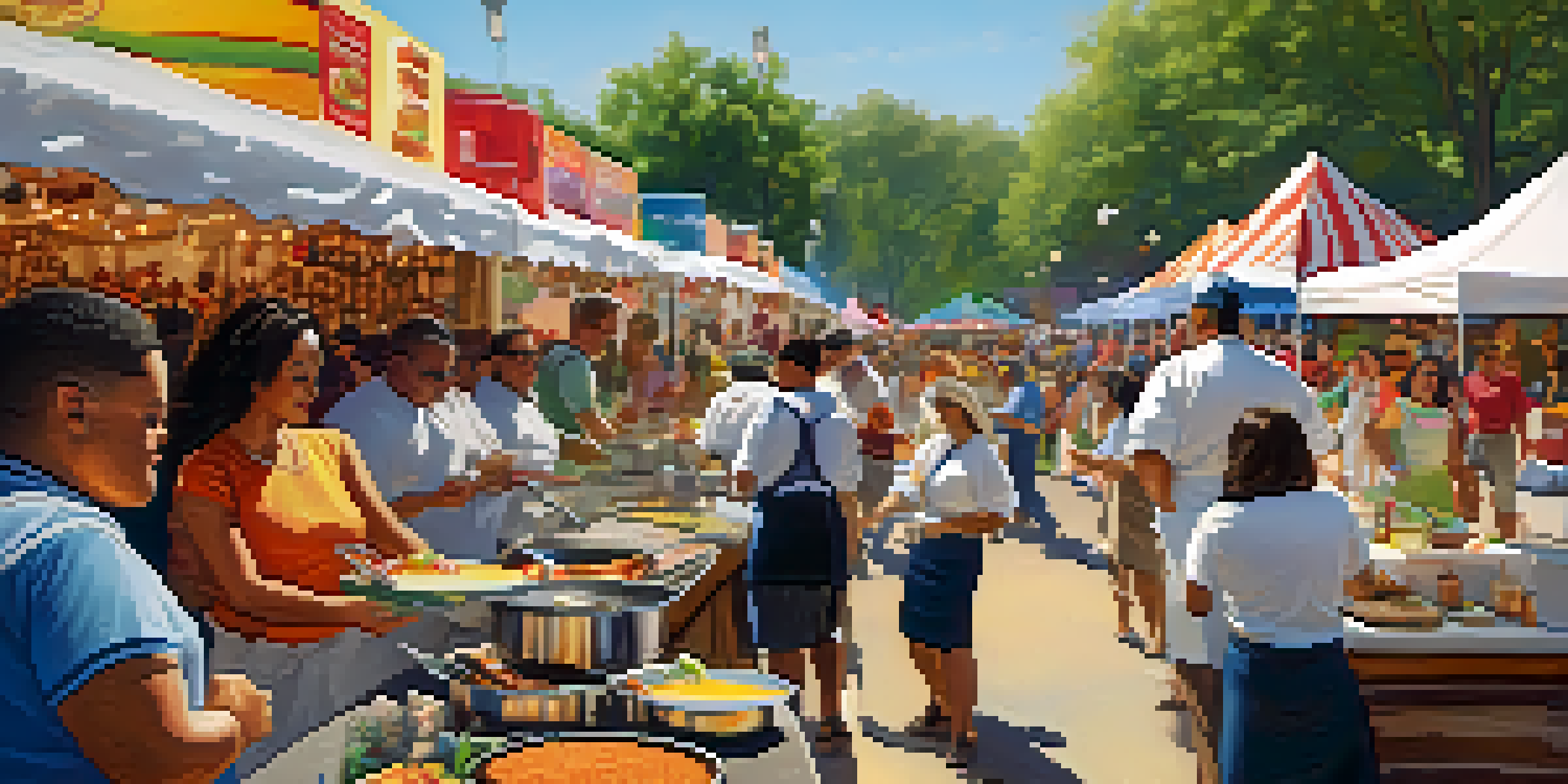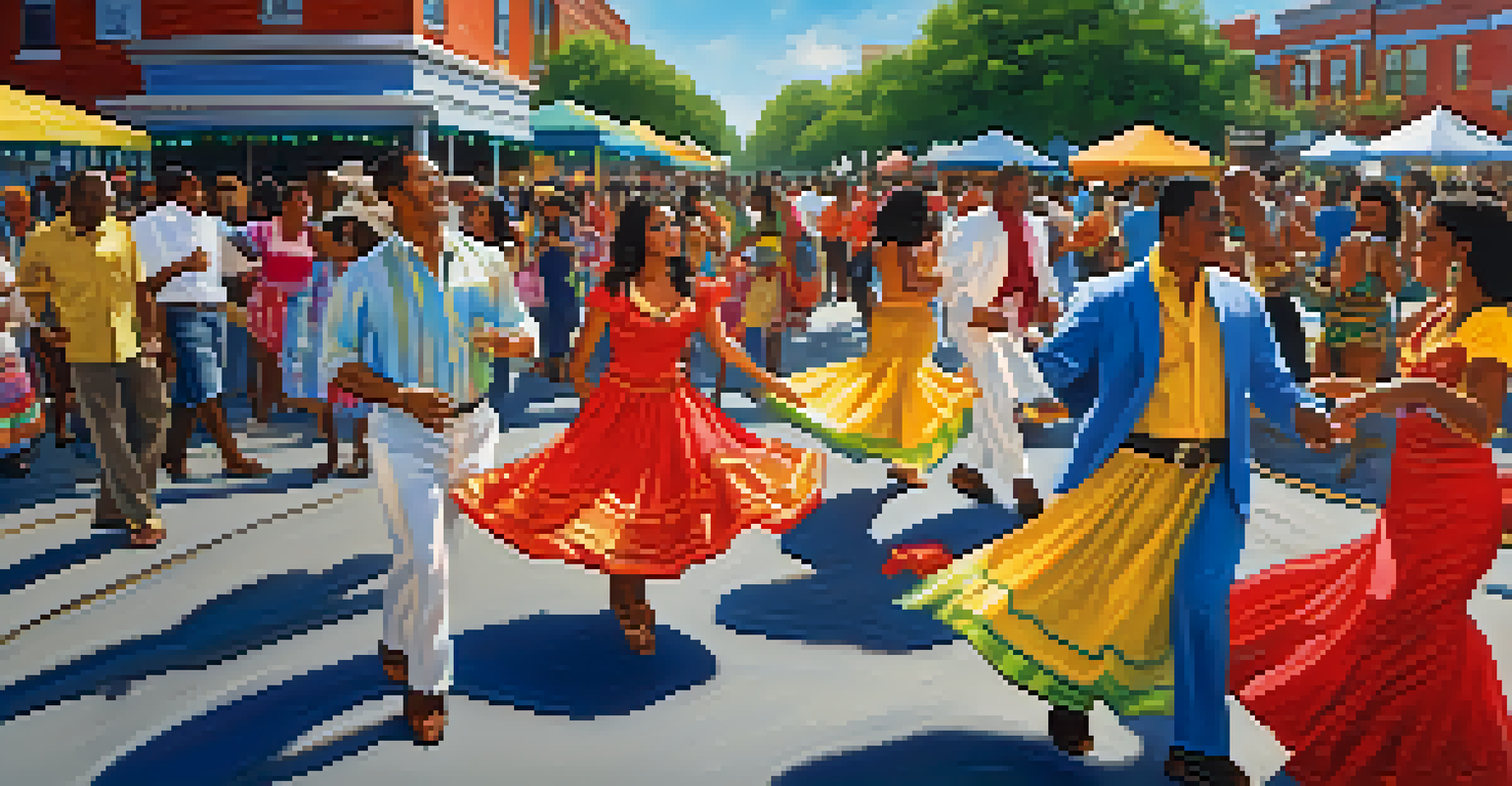Celebrating Hispanic Heritage: Festivals and Contributions in GA

Understanding Hispanic Heritage in Georgia
Hispanic Heritage Month is a time to celebrate the rich tapestry of Hispanic culture in the United States, and Georgia is no exception. Throughout the state, various communities come together to honor their roots and share their traditions. From music and dance to food and art, the contributions of Hispanic individuals and communities are woven into the fabric of Georgia's cultural landscape.
Cultural heritage is the foundation of our identity, and through education and celebration, we honor our past while shaping our future.
The celebration goes beyond just a month; it's an ongoing appreciation of the influence that Hispanic cultures have on American society. Many Georgians may not realize how deeply these traditions have permeated their lives, from the cuisine enjoyed at local restaurants to the vibrant festivals that take place annually. This heritage is a source of pride for many, fostering a sense of belonging among diverse populations.
In Georgia, the Hispanic community has significantly contributed to the economy, arts, and education. As we explore the various festivals and events, we will see how these celebrations not only honor history but also pave the way for future generations to embrace their cultural identity.
Key Festivals Celebrating Hispanic Culture
One of the most prominent events is the Atlanta Salsa Festival, which showcases the vibrant rhythms and dances of Latin America. This festival attracts thousands of attendees who come to enjoy live music, dance performances, and salsa lessons. It’s an excellent opportunity for both Hispanic and non-Hispanic individuals to immerse themselves in the culture and engage with the community.

Another notable celebration is the Georgia Latino International Film Festival, which highlights the work of Latino filmmakers and artists. By showcasing films that represent Hispanic stories, the festival provides a platform for voices often underrepresented in mainstream media. It's a fantastic way to foster understanding and appreciation of diverse experiences through the lens of cinema.
Celebrating Hispanic Culture in Georgia
Hispanic Heritage Month highlights the vibrant traditions and contributions of Hispanic communities throughout Georgia.
Additionally, the annual Fiesta Atlanta brings together food, art, and music, creating a festive atmosphere that celebrates the Hispanic community in the heart of the city. With local vendors offering authentic cuisine and artisans displaying their crafts, attendees can experience the richness of Hispanic culture firsthand, making it a must-visit event for anyone in the area.
Culinary Contributions from Hispanic Communities
Hispanic cuisine is known for its bold flavors and rich ingredients, making it a beloved aspect of Georgia's culinary scene. From traditional tacos and tamales to empanadas and churros, these dishes have become staples in many local restaurants. Each recipe tells a story, often passed down through generations, reflecting the diverse backgrounds of the chefs preparing them.
Food brings us together, and through sharing meals, we share our stories and our cultures.
Food festivals, like the Latin Fest in Atlanta, play a crucial role in showcasing these culinary delights. They provide a platform for local chefs and food vendors to share their heritage through cooking demonstrations and tastings. Visitors can explore a variety of dishes, demonstrating how food serves as a bridge between cultures, inviting everyone to come together over a shared meal.
Moreover, Hispanic chefs and restaurateurs have significantly impacted the food landscape in Georgia. Their innovative approaches to traditional recipes have not only enriched the local cuisine but also encouraged culinary fusion that resonates with many palates, creating a vibrant dining scene that celebrates diversity.
The Role of Music and Dance in Celebrations
Music and dance are integral components of Hispanic heritage, often serving as expressions of cultural identity and community pride. Festivals in Georgia frequently feature live performances from local bands playing salsa, merengue, and bachata, inviting attendees to join in the fun. These lively rhythms create an infectious energy that encourages everyone to dance, regardless of their skill level.
For instance, the Atlanta Jazz Festival has showcased Latin jazz artists, blending traditional jazz with Hispanic influences, illustrating the dynamic nature of these art forms. Such events not only entertain but also educate audiences about the historical and cultural significance behind the music, fostering a deeper appreciation for Hispanic artistry.
Key Festivals Showcase Diversity
Festivals like the Atlanta Salsa Festival and Georgia Latino International Film Festival celebrate the rich cultural heritage and artistic expressions of Hispanic individuals.
Additionally, dance workshops held during these festivals offer people a chance to learn traditional dances, further connecting them to the culture. These interactive experiences allow participants to not only enjoy the festivities but also understand the stories and traditions that accompany each step and beat.
Art Exhibitions Highlighting Hispanic Artists
Art plays a significant role in celebrating Hispanic heritage, with numerous exhibitions showcasing the talent of Hispanic artists in Georgia. Galleries and cultural centers often host events that display a variety of art forms, from paintings and sculptures to photography and installations. These exhibitions allow artists to express their cultural narratives and perspectives, enriching the local art scene.
One notable event is the Atlanta Contemporary Art Center's Hispanic Heritage Month exhibition, which features works by both emerging and established artists. By providing a platform for these creatives, the exhibition fosters dialogue about identity, heritage, and social issues, highlighting the importance of representation in the arts.
Engaging with art not only promotes cultural appreciation but also encourages community involvement. Many of these exhibitions include interactive elements, such as artist talks and workshops, inviting attendees to participate and learn more about the artistic process and the cultural contexts behind the works.
The Importance of Education in Cultural Preservation
Education is a vital tool for preserving Hispanic heritage and ensuring that future generations understand their cultural roots. Many schools in Georgia incorporate Hispanic studies into their curricula, highlighting the contributions of Hispanic individuals in various fields, such as science, art, and literature. This focus helps foster a sense of pride among students of Hispanic descent while promoting cultural awareness among their peers.
Community organizations also play a significant role in this educational effort by offering workshops, classes, and resources that celebrate Hispanic culture. These initiatives often include language courses, cooking classes, and cultural storytelling, allowing participants to engage with their heritage in meaningful ways. By providing these opportunities, organizations help keep traditions alive and relevant.
Education Preserves Cultural Identity
Educational initiatives in schools and community organizations play a crucial role in preserving Hispanic heritage for future generations.
Moreover, the emphasis on education extends to public events and festivals that include informative sessions about Hispanic history and cultural practices. Such programming not only enriches the experience for attendees but also ensures that the legacies of Hispanic communities continue to thrive in Georgia.
Future of Hispanic Heritage Celebrations in Georgia
As Georgia continues to grow and diversify, the celebration of Hispanic heritage is expected to expand and evolve. New festivals and events are emerging, reflecting the changing demographics and cultural influences within the state. This growth signifies an increasing recognition of the contributions of Hispanic communities to Georgia's history and identity.
Additionally, partnerships between local governments, cultural organizations, and community members are crucial for the future of these celebrations. By working together, they can create inclusive events that not only highlight Hispanic culture but also invite participation from all community members. This collaboration fosters unity and promotes a deeper understanding of the diverse cultures that enrich Georgia.

Looking ahead, it's essential to continue prioritizing education and representation in these celebrations. By ensuring that Hispanic voices are heard and celebrated, Georgia can cultivate a vibrant cultural landscape that honors its past while inspiring future generations to embrace their heritage.